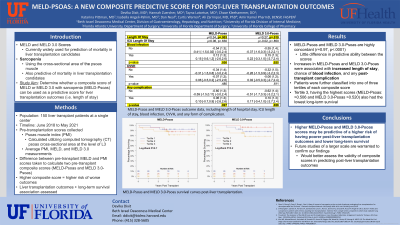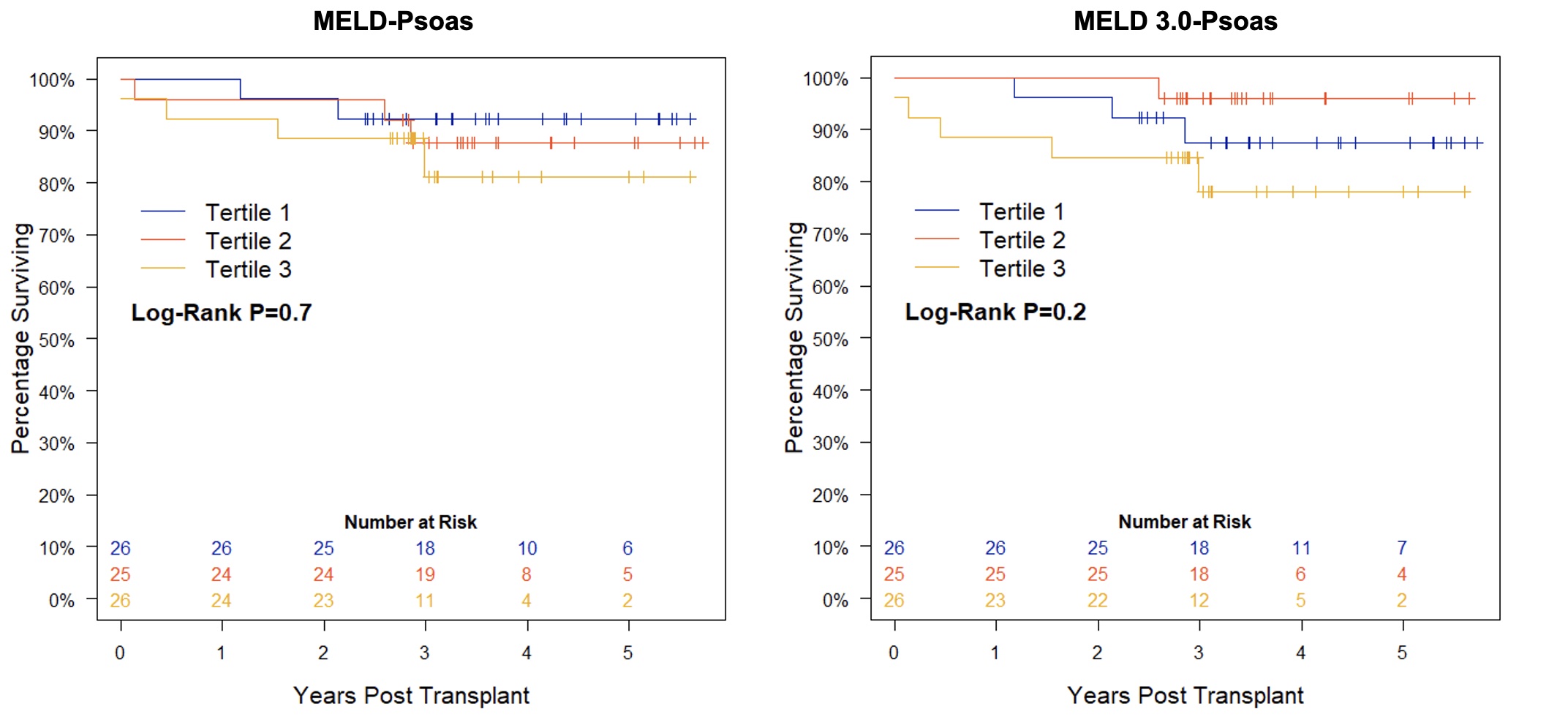Tuesday Poster Session
Category: Liver
P4613 - MELD-Psoas: A New Composite Predictive Score for Post-Liver Transplant Outcomes
Tuesday, October 29, 2024
10:30 AM - 4:00 PM ET
Location: Exhibit Hall E

Has Audio

Devika Dixit, MD
University of Florida College of Medicine
Gainesville, FL
Presenting Author(s)
Devika Dixit, MD1, Andrew C. Kleehammer, DO1, Tayna Latortue, MD2, Hannah Zuercher, MD1, Katarina M. Pittman, MD2, Amir Y. Kamel, PharmD3
1University of Florida College of Medicine, Gainesville, FL; 2University of Florida, Gainesville, FL; 3University of Florida Health Science Center, Gainesville, FL
Introduction: In addition to the MELD or MELD 3.0 score, sarcopenia, which can be estimated by the cross-sectional area of the psoas muscle, has been shown to be predictive of mortality in candidates for liver transplantation. The aim of this study was to determine whether a composite score of MELD or MELD 3.0 with sarcopenia (MELD-Psoas) can be used as a predictive score for liver transplantation outcomes.
Methods: A cohort (n=150) of patients transplanted from June 2018 to May 2021 were examined. Prior to transplantation, the psoas surface area (cm^2) was measured on a computed tomography (CT) at the level of L3 and divided by the square of the height (mm) to calculate the psoas muscle index (PMI). The average PMI, MELD, and MELD 3.0 measurements within 6 months prior to transplantation was used. Two pre-transplant composite scores (MELD-Psoas and MELD 3.0-Psoas) were created by taking the difference between the pre-transplant MELD and PMI scores. A higher composite score meant a higher risk of poorer liver transplantation outcomes. Univariate models and Kaplan-Meir survival curves were used to assess the composite scores' association with liver transplantation outcomes and long-term survival.
Results: Overall, the correlation between the MELD-Psoas and MELD 3.0-Psoas was nearly perfect (r=0.97, p< .0001); therefore, there is little difference in predictive ability between the scores. Both increases in MELD-Psoas and MELD 3.0-Psoas were associated with increased length of stay (p=0.003 and p=0.019, respectively), increased chances of blood infection (p=0.030 and p=0.025, respectively) and any post-transplant complication (p=0.027 and p=0.026, respectively) (Table 1). Patients were further classified into one of three tertiles of each composite score, Tertile 3 of MELD-Psoas and MELD 3.0-Psoas having the highest scores ( >0.506 and >0.520, respectively). Tertile 3 of MELD-Psoas and MELD 3.0-Psoas had the lowest long-term survival (Figure 1).
Discussion: Higher MELD-Psoas and MELD 3.0-Psoas scores may be predictive of a higher risk of having poorer post-liver transplantation outcomes and lower long-term survival. Larger studies would be beneficial for future studies to better assess the validity of the composite scores in predicting post-liver transplantation outcomes.

Note: The table for this abstract can be viewed in the ePoster Gallery section of the ACG 2024 ePoster Site or in The American Journal of Gastroenterology's abstract supplement issue, both of which will be available starting October 27, 2024.
Disclosures:
Devika Dixit, MD1, Andrew C. Kleehammer, DO1, Tayna Latortue, MD2, Hannah Zuercher, MD1, Katarina M. Pittman, MD2, Amir Y. Kamel, PharmD3. P4613 - MELD-Psoas: A New Composite Predictive Score for Post-Liver Transplant Outcomes, ACG 2024 Annual Scientific Meeting Abstracts. Philadelphia, PA: American College of Gastroenterology.
1University of Florida College of Medicine, Gainesville, FL; 2University of Florida, Gainesville, FL; 3University of Florida Health Science Center, Gainesville, FL
Introduction: In addition to the MELD or MELD 3.0 score, sarcopenia, which can be estimated by the cross-sectional area of the psoas muscle, has been shown to be predictive of mortality in candidates for liver transplantation. The aim of this study was to determine whether a composite score of MELD or MELD 3.0 with sarcopenia (MELD-Psoas) can be used as a predictive score for liver transplantation outcomes.
Methods: A cohort (n=150) of patients transplanted from June 2018 to May 2021 were examined. Prior to transplantation, the psoas surface area (cm^2) was measured on a computed tomography (CT) at the level of L3 and divided by the square of the height (mm) to calculate the psoas muscle index (PMI). The average PMI, MELD, and MELD 3.0 measurements within 6 months prior to transplantation was used. Two pre-transplant composite scores (MELD-Psoas and MELD 3.0-Psoas) were created by taking the difference between the pre-transplant MELD and PMI scores. A higher composite score meant a higher risk of poorer liver transplantation outcomes. Univariate models and Kaplan-Meir survival curves were used to assess the composite scores' association with liver transplantation outcomes and long-term survival.
Results: Overall, the correlation between the MELD-Psoas and MELD 3.0-Psoas was nearly perfect (r=0.97, p< .0001); therefore, there is little difference in predictive ability between the scores. Both increases in MELD-Psoas and MELD 3.0-Psoas were associated with increased length of stay (p=0.003 and p=0.019, respectively), increased chances of blood infection (p=0.030 and p=0.025, respectively) and any post-transplant complication (p=0.027 and p=0.026, respectively) (Table 1). Patients were further classified into one of three tertiles of each composite score, Tertile 3 of MELD-Psoas and MELD 3.0-Psoas having the highest scores ( >0.506 and >0.520, respectively). Tertile 3 of MELD-Psoas and MELD 3.0-Psoas had the lowest long-term survival (Figure 1).
Discussion: Higher MELD-Psoas and MELD 3.0-Psoas scores may be predictive of a higher risk of having poorer post-liver transplantation outcomes and lower long-term survival. Larger studies would be beneficial for future studies to better assess the validity of the composite scores in predicting post-liver transplantation outcomes.

Figure: Figure 1: Percentage of surviving post liver transplantation by tertiles of MELD-Psoas and MELD 3.0-Psoas composite scores.
Note: The table for this abstract can be viewed in the ePoster Gallery section of the ACG 2024 ePoster Site or in The American Journal of Gastroenterology's abstract supplement issue, both of which will be available starting October 27, 2024.
Disclosures:
Devika Dixit indicated no relevant financial relationships.
Andrew Kleehammer indicated no relevant financial relationships.
Tayna Latortue indicated no relevant financial relationships.
Hannah Zuercher indicated no relevant financial relationships.
Katarina Pittman indicated no relevant financial relationships.
Amir Kamel indicated no relevant financial relationships.
Devika Dixit, MD1, Andrew C. Kleehammer, DO1, Tayna Latortue, MD2, Hannah Zuercher, MD1, Katarina M. Pittman, MD2, Amir Y. Kamel, PharmD3. P4613 - MELD-Psoas: A New Composite Predictive Score for Post-Liver Transplant Outcomes, ACG 2024 Annual Scientific Meeting Abstracts. Philadelphia, PA: American College of Gastroenterology.
